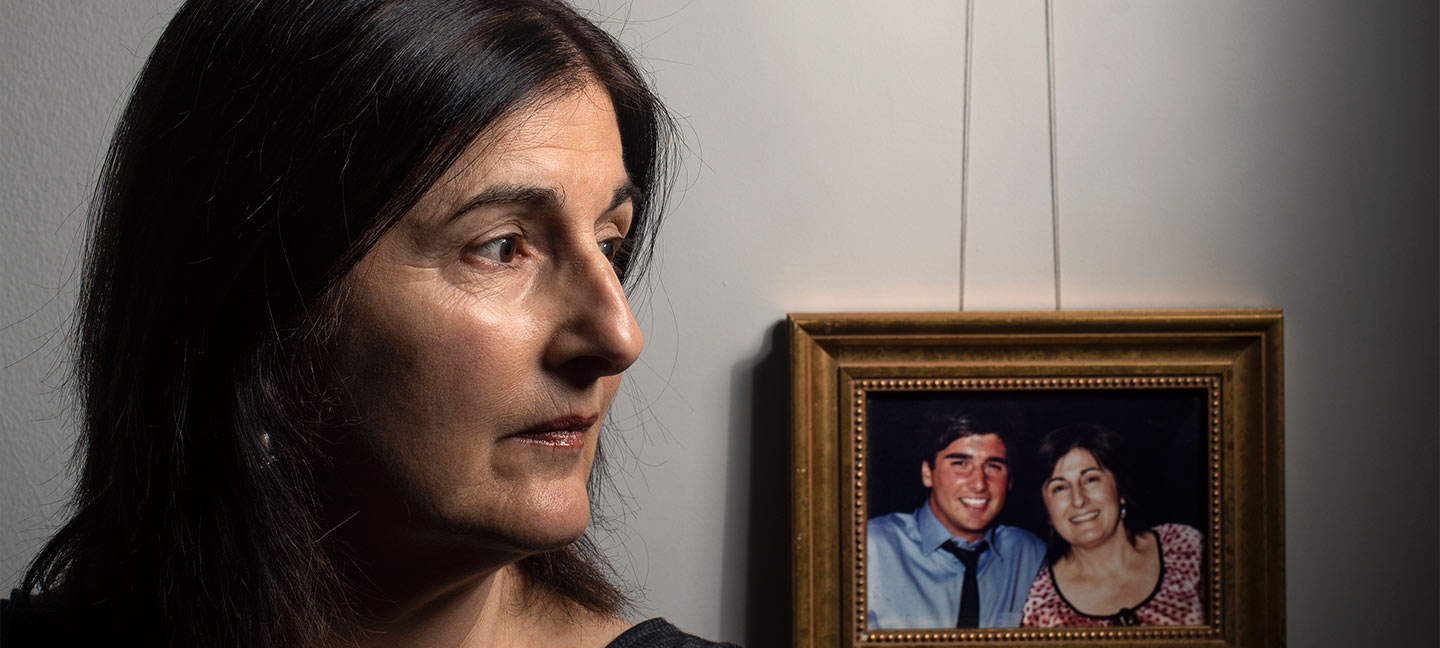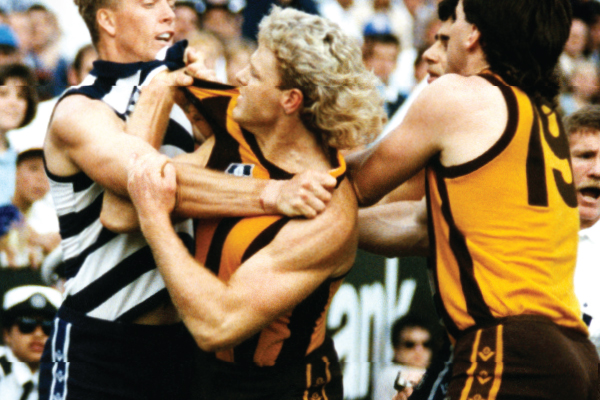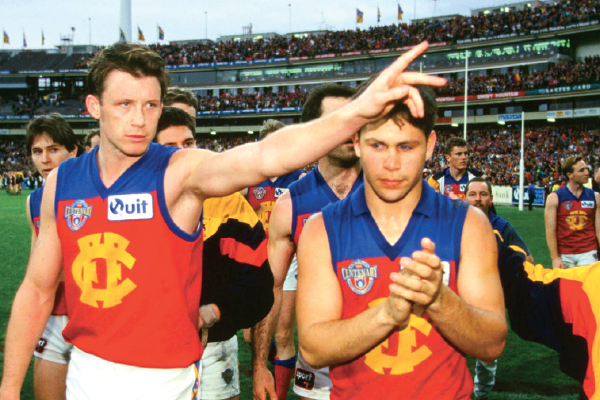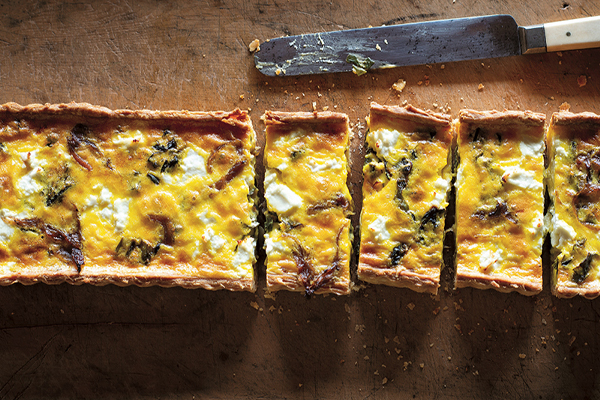STOP. One Punch Can Kill
21 Aug 2020 | Barry Dickins
In One Punch, Barry Dickins reflects on the many types of violence that can now affect everyday life. In his heartfelt exploration of the subject, Barry talks to many of the people whom this violence impacts, including the parents of children who have been killed, professionals in the justice system, and children who live in communities where violence is rife.
I first met Caterina Politi through former Victims of Crime commissioner Greg Davies. She and I met in a fashionable cafe in Carlton; we took our coffees at the back where we could properly hear one another. She was preparing both to fly overseas and to try to find a new home somewhere and was preoccupied with these activities. After the coffees we made a tentative agreement to do the interview sometime later on.
And so now those months have gone by and I am walking up her sunny drive in a leafy suburb of Melbourne, carrying my notebooks and pens as well as a small amount of blood oranges that I hope are succulent. She seems somewhat refreshed after her holiday and welcomes me into her new home and makes both of us excellent coffees, this time sipped and enjoyed in peace.
We sit together at her kitchen table and I am glad she likes the blood oranges. As we sip our coffees she says she had no idea it was really six months since we met in Carlton and I have to agree that time flies.
‘I got a call from a reporter recently,’ Caterina says, ‘And she told me, “I don’t really know how to tell you this but your son David’s killer has been on day release, playing footy on a Saturday, and that since the end of last year he’s been out and about.” I burst into tears at that, I tell you; that he’s been in for three and a half years and is now playing footy on a Saturday; I assumed that jail meant the suspension of liberty and now he’s on day release; it just makes a mockery of everything.’
Caterina went on Tom Elliott’s radio show on 3AW and spoke about one punch, and Elliott’s listeners were disgusted.
‘He is on a six-year minimum sentence so why is he immediately on day release?’
I gaze around the pretty apartment and amongst the tasteful furniture and decorations and pictures a sudden beam of sun brightly shines through the lounge room window. I can easily see a framed photo of mother and son, with him looking relaxed and nonchalant nestled up to her shoulder.
‘“How about putting my son first,” I thought. You’re putting rehabilitation before my son. It is the wrong way around! The judiciary believes they’ll all be reformed. His killer pleaded guilty almost two years after killing David, pleading guilty on the morning of the trial. He wasn’t remorseful, even though he should have been devastated by his own actions.’
Our discussion turns to the law outside Victoria. ‘In New South Wales they are treated differently and can have maximum security for six months at least, as opposed to having an enjoyable boot of the footy. There are four criteria. I can’t remember all of them, but you have to prove intent and to infer it was a punch to the head.’
She mimes throwing a punch sitting in her chair and I have to say that in my experience the one throwing the punch always goes for the head as there is more collective damage that way.
‘You cannot use the phrase “coward’s punch” in court, as it is always to be called simply “one punch” or the manslaughter law will not be accepted. The term “one punch” has joined the legislature.’
I ask Caterina whether being able to prove intent would mean it is then a murder charge in court? She says that it should be.
Then she tells me the horrific story of what happened to her son, David.
‘It was almost five and a half years ago down at Portsea. My son and his friends were all out on 30 December, celebrating a friend’s birthday, and it went late into the night. They caught the bus and ended up at the Rye shops and were walking towards Rosebud, where their accommodation was. It was a cool night, not hot at all, unusual for summer. The police said that David had kept his arms tucked into his shirt for warmth. It had just ticked over midnight.’
David and his friends walked past the ATM, which was where they saw the killer for the first time. ‘This boy called Dylan Closter crossed over the road and as he was doing that, one of my son’s friends was mucking around a bit with a street sign just for the fun of it. They were just walking along the footpath together and David’s two friends were at the back. Closter walks up to David and gives him a hip and shoulder, you know, as a challenge. He hip and shouldered him big time to check if he would fight him. David called out, “Oh have a sick one, mate?” And David and friends kept on walking. Then Dylan Closter shouts out, “Do you want a fight?” David keeps walking away and says, “Fuck off!”, or words to that effect.’
The assailant went into a fighting stance, a boxing position. He was ready for a fight.
‘We were told David missed the first punch, then Closter tackled him to the ground.
‘In that moment, Closter’s mates ran across the road and David’s friends, who were ahead, heard the commotion and ran back to assist. A boy or man called Tyrone Russell, who was a professional Muay Thai fighter and one of that group, punched two of David’s mates called Jesse and Julian. Those blows were very forceful. Jesse was unconscious on the ground with a broken jaw. Julian was also felled to the ground and was lucky he fell on to his side, sustaining cuts and bruising. A few of Closter’s friends had been watching the fight but didn’t do anything to stop it. There was a guy called Vasu in David’s group who was punched to the side of his head and that was this man Thomas McCluskey-Sharp’s fifth offence that night. He was on a three-month suspended sentence. He had assaulted a man and a woman because he felt like it. He allegedly assaulted two young boys in the Rye carnival area approximately 45 minutes earlier, in an incident totally unrelated to David and his friends. These charges were dropped.’
She is weeping and I tell her how sorry I feel for what has happened and she says that is alright and stares straight into my eyes and blows her nose in order to continue.
Although David’s friends ran back to assist they were ambushed by Russell and McCluskey-Sharp. This allowed Closter to punch Andy (the birthday boy) and Vincent. David got to his feet and was seen on CCTV walking away backwards with his hands in the surrender position, showing he was of no threat and did not want to fight.
‘All I know was that my son David got up off the ground backwards after the hip and shoulder attack. He tried to communicate with his attacker, you know, to appeal to him. He had his arms up, saying through his use of body language that enough is enough, showing he wasn’t going to fight or participate.’
Caterina cries.
‘It was a roundhouse-style punch, it lifted my son off the ground, and he was unconscious before he hit the ground. It lifted him by his jaw and shattered his skull. It created brain trauma spontaneously and then there was no blood supply to my son’s brain.
‘Then they all ran off, the whole gang of them, and Closter yelled out, so cocksure of himself, he yelled out, “This is what we came here for!” Like it was a triumph for them or something great! Like they were having their fun, kind of thing!
‘David was resuscitated at the scene by a 17-year-old boy, a complete stranger, until the police and paramedics arrived. I got the phone call at about 1 am; it was Vasu on the phone, and he said, “Something has happened to David!” I then spoke with Julian, who said he had spoken with David.
‘When I spoke to the police, they didn’t paint a worst-case scenario at all. So initially I thought that David would be okay, but he wasn’t okay. “Is he going to be okay,” that was all I thought about!
‘David was airlifted to the Alfred Hospital and I knew he was going to the best possible hospital. Together with David’s father, Paul, sisters Elisa and Luisa and their partners Kosta and James, we drove to the hospital.
‘We saw the air ambulance land on the helipad and saw David up high on the stretcher, heading to the ED; that was the worst thing, to see that, to have to look at that. We were outside on the ground level of the hospital. I remember the rotor noise! The noise of that helicopter haunts me now.’
In the waiting room, Caterina was frantically making calls to friends and family, letting them know what had happened. They gradually arrived, coming to wait with her along with David’s father and sisters. After an agonisingly long wait three doctors came out and I said to my daughters, “This isn’t going to be good news.” If there is just one doctor you might have some hope, but with three doctors coming at you there’s not a lot of hope going to come out of it. And then the doctors said, as if they were saying it together, “There is nothing we can do for your son,” but they would still run tests to be absolutely sure.’
Caterina takes a deep breath.
‘I heard them, but it was as though they were talking to someone else. It was all going too fast, the whole thing was speeding out of control. One of the doctors said to us, “Have you considered organ donation?” It was too fast to answer something like that. It had only just happened and they were requesting my son’s organs.’
Caterina and her family agreed to the organ donation if it came to that.
‘We were gunned down. We didn’t have a chance to take it all in.’
She was taken to see David, and she cries as she remembers the next mad scene.
‘At three thirty in the morning; this was in amongst a lot of cubicles. But the curtains weren’t drawn! I can’t believe they didn’t draw the curtains around our son. He was so exposed, it was like he was abandoned. Then they took David up to intensive care, to a more private room to be monitored. It was as if my time with David was hijacked! They were already thinking of possible organ recipients. They ran more tests and with those in hand the doctor announced to us that David was brain dead.’
David passed away at three fifty-five in the afternoon on New Years’ Eve, 2012. From that first phone call it had been only 15 hours. ‘This allowed us to hug him and kiss him; he was still warm and I am forever grateful to the first responders for keeping him alive.
‘We stayed with him while he was on the ventilator for 30 hours. As it ticked over to midnight a new year had arrived. I could see the fireworks in the distance and staff on the helipad celebrating the New Year. Ours would be one of devastation and grief, losing David at the hands of this evil human. Then at eight thirty in the morning they took him away to collect his organs. We said another goodbye and he looked so beautiful and so special. I can still see it all clearly, the donation people closing the door. It was only when I saw the Homicide Squad that it occurred to me that David had been murdered.’
She is crying again, and why should she not, and as she blows her nose I look again at the photo of mother and son, grinning away. The birds of early September commence their sweet and unstoppable whistling sounds, which suddenly seem ironic and cruel.
‘I wasn’t able to sleep for weeks and months after it happened and then of course the ensuing nightmares come, don’t they? I dream of it, and of catching the perpetrator. He murdered my son, who just wouldn’t fight him and who put up both of his arms to show surrender. He still killed him anyway.
‘It unsettled his father when it became clear the extent of the attack; he should have been charged with murder because he went out deliberately to murder someone; anyone! He tried to provoke my son, who wouldn’t fight him and put up both of his arms to show surrender, but he still killed him anyway. The missed punches are murder too; even the missed ones are murder.
‘The police said they needed to prove “intent” and I said the “intent” was there after the first contact, then the boxing stance, then the first punch that missed, the tackle to the ground; he then punched Andy and Vincent, then he chased David; even though David was walking away, Closter unleashed that ferocious punch.
‘After nearly two years and many “not guilty” pleas, the men started by pleading guilty, Russell to recklessly causing serious injury and recklessly causing injury and affray. One was sentenced to fifteen months … maximum! It was then increased to three years on appeal and 21 months non-parole.
‘David’s killer pleaded guilty to manslaughter and affray. He did a plea bargain, having two common assault charges dropped.’
David’s killer was eventually sentenced to nine years three months in prison, with a non-parole period of six years.
‘There was no expression on his face at all. He was in court seated behind us, right behind us. No remorse and no contrition. You asked me if he sent me a letter of sorriness; well of course he didn’t, because he wasn’t sorry at all. I mean, he got away with it. Made a joke out of the law, he did! David’s friends used to see him in the shopping plaza, doing his shopping while on bail. That was extremely frightening for them.’
Caterina never received an apology letter from Closter.
When this happened, it was put on Facebook straight away that my son David started the trouble, that is what Closter’s mates posted on Facebook, but I said to all of them, “Ask Victoria Police to view the CCTV footage and that will clearly show who the aggressors were.” The one who wrote that it was David’s fault, he commented no more.’
Through STOP. One Punch Can Kill, Caterina now receives invitations to speak about her loss at schools and sporting clubs. She tells people about the dangers of excessive drinking and taking drugs, and how this can lead to violence.
‘Also be aware of who you are as a person, acknowledge any issues with aggression and seek help. Through STOP. One Punch Can Kill we are doing what we can to proactively promote this. But we can’t do it all alone. We can all play a part to stop these senseless acts of violence. It begins at home with parents, it can be reinforced through schools, the government, the police and the media.’
It is now time for me to go, as she has been speaking in such a heartfelt way and so willingly on a subject no mother ought to have to wrap her mind and memory around. I walk down her drive back to my car, having shaken hands with her politely. She tells me that I should get in touch if she can help me further.
It is heartbreaking as well as ennobling to hear Caterina Politi speak, and to remember the very thing no mother ought to resurrect, but she is articulate and eloquent and everything she tells me is pure and perfectly in harmony with her everlasting love and adoration of her poor son.
As I motored off upon a spring day so stunning that it seemed to satirise the ability to feel such sorrow, I found each and every sensation and word of hers so profoundly touching and memorable, as though I should be incapable of ever forgetting exactly what she told me. The drive back home became fraught with ideas and images of such attacks on young men or teenagers who have done nothing to deserve such annihilation, when other kids make a fist and make a deal within themselves to go out and kill someone.
This violence is so completely at odds with the manner in which I grew up, where on our street the fathers had a bowl of the tennis ball at the rubbish-tin wickets of the happy and protected sons. And the young mums played catch the ball with their daughters and there was never any danger of being run over because no motorist would ever dream of speeding close to families.
But where I live today, in the so-called safe side streets, it is common to see drivers go like rockets out of boredom and shriek through pedestrian crossings, even if the old folks are limping in their fashion across to the other side; every single day I observe the contempt of drivers for kids and sick old people and the smoke off the tyres of hoons as they play chicken with the innocents.
I thought about Caterina’s stories and the mental imagery that she’d shared with me and how tragic and wasteful David’s death was.
I drove through busy junctions and crowded side streets in a very careful manner, realising more than ever the sanctity of life, with a new appreciation of the sky and the day and the air; all the lovely things you do take completely for granted. As I pulled up at my place, the overwhelmingly ugly, cream-brick veneer horror that I must endure, I contemplated the vague hope of another tenant inviting me in for tea with their family.
Reading through my notes from the interview with Caterina, I mentally thank her for her kindness and openness in giving me her stories so freely and unstintingly and put them with my other notes from a recent interview with the Cronin family, Robyn and Matt, who lost their son too to the one-punch phenomenon.
This is an edited extract from One Punch by Barry Dickins
Available now in all good bookstores and online
Click here for your preferred online retailer



